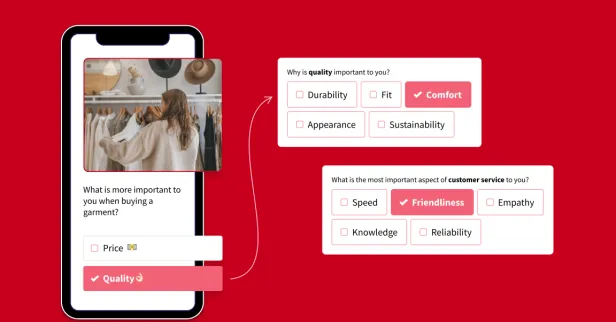Agile market research is synonymous with flexibility, collaboration, and iterative learning.
In today's market, where brands need to make decisions quickly to get (and stay) ahead, traditional market research methods just aren't cutting it anymore.
Enter the agile research movement.
Today, we'll explore how an agile market research approach can quickly deliver deep and actionable insights through a flexible and iterative process.
What is Agile Market Research?
Agile market research emphasizes flexibility, collaboration, and rapid iteration to deliver quality insights quickly. Allowing you to test different ideas before making critical decisions on your products, marketing, design, or service.
How does it work?
Agile market research involves conducting research in short, iterative cycles, or 'sprints', using technology (like AI and/or machine learning) to automate time-consuming processes.
Once a study is complete, the insights are used to inform the next round of testing. But it's not just the data that gets picked apart- teams will often use the end of each sprint to look back at the process and remove roadblocks to improve efficiency.
The result?
When done right, an agile methodology will help you explore, test, iterate, and refine ideas quickly, gaining the insights you need to make critical business decisions faster.
Why Should I Use an Agile Market Research Approach?
Not only is agile market research considerably faster than traditional methods, but it also affords you much more flexibility.
By conducting your research in short cycles- instead of large one-off studies- you can quickly act on learnings and avoid wasting time and resources on low-potential ideas.
An agile approach can also free up the budget for research and insights departments. Bringing your insights in-house and using tech to automate the heavy lifting allows you to screen ideas quickly with smaller audiences without committing significant resources to any one project.

How Can I Use Agile Market Research?
![]() Test Your Product Ideas- Conduct small-scale tests with target markets to rapidly iterate on your product design and quickly identify the elements that work.
Test Your Product Ideas- Conduct small-scale tests with target markets to rapidly iterate on your product design and quickly identify the elements that work.
![]() Keep a Pulse on Customer Satisfaction- Use surveys, online reviews, and other feedback mechanisms, to seamlessly gather and analyze customer satisfaction data to improve your processes in real time.
Keep a Pulse on Customer Satisfaction- Use surveys, online reviews, and other feedback mechanisms, to seamlessly gather and analyze customer satisfaction data to improve your processes in real time.
![]() Perfect Your Marketing- Test your marketing collateral with small-scale audiences to swiftly identify which messages, graphics, and channels are most effective.
Perfect Your Marketing- Test your marketing collateral with small-scale audiences to swiftly identify which messages, graphics, and channels are most effective.
![]() Identify Emerging Trends- Use consumer sentiment data from brand tracking and customer satisfaction studies to stay ahead of the trends in your space.
Identify Emerging Trends- Use consumer sentiment data from brand tracking and customer satisfaction studies to stay ahead of the trends in your space.
![]() Optimize Your Pricing Strategy- Test different pricing strategies with small groups of customers to quickly identify the most effective pricing model for your products or services.
Optimize Your Pricing Strategy- Test different pricing strategies with small groups of customers to quickly identify the most effective pricing model for your products or services.
Agile Market Research with SightX
The SightX platform is the only tool you'll ever need for agile market research: a single, unified solution for consumer engagement, data collection, advanced analysis, and reporting. While powerful enough for insights teams at Fortune 500 companies, the user-friendly interface makes it simple for anyone to start, optimize, and scale their research.
Plus, with SightX's research team, you can gain access to the best thinking in the insights field. Our in-house experts will guide you through every step in the market research process, from survey scripting to analysis support, and everything in-between.
If you're ready to get started with agile market research, sign up today!
